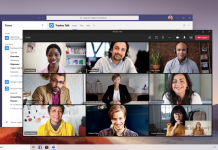Meta may be speeding up internal testing for its own first-party cloud gaming service, which might allow users to play PC VR games using its latest standalone VR headgear, Quest 2, without having to buy a VR-ready computer.
The ‘Avalanche’ cloud PC VR streaming capability is said to have been discovered in Quest firmware v24, which was published in late 2020. The following string was discovered in the firmware by data miner and Reddit user ‘Samulia’ in April, according to Tech analyst and YouTuber Brad Lynch:Samulia is also known for extracting the Meta logo before it was officially published in February, as well as a flood of data from following firmware releases pointing to Project Cambria, the company’s next VR headset.
Samulia is also recognised for extracting the Meta logo before it was officially released in February, as well as a slew of information from the company’s subsequent firmware releases pointing to Project Cambria, the company’s next VR headset.
Lynch, who is best known for his YouTube channel SadlyItsBradley, now claims to have talked about cloud PC VR streaming with someone who was able to remotely play Asgard’s Wrath (2020), an Oculus PC exclusive, on Quest 2.
The customer complained that the quality was “not very good,” according to Lynch, but this might be explained by the fact that they were in the United Kingdom and had to connect to a PC in the United States.
We are unable to verify the accuracy of that information, but Meta may be carving out its own niche for Quest cloud gaming. Meta has already taken efforts to remove cloud gaming apps from both its main Quest Store and App Lab, Meta’s app store with less strict content submission criteria.
This might indicate that Meta is working on its own PC VR cloud gaming service, similar to what it did with its own flat screen cloud gaming service during the last two years. Notably, former Oculus executive Jason Rubin is leading the flatscreen cloud gaming project, which is well aware of the fundamental constraints of standalone headsets when it comes to cramming in high-quality material. Rubin currently oversees all game content at Meta, including AR/VR development and the Instant and Cloud Play Platform within the Facebook app, as of July 2021.
Meta CEO Mark Zuckerberg addressed the junction of Facebook’s cloud gaming and VR ambitions in a quarterly earnings call in late 2020:
“In the long run, I believe the VR component will undoubtedly play a role in [our game strategy].” Of course, some of the cloud gaming work we’re doing will be valuable for VR, and we’re forming a large community around it on Oculus.”However, I believe [our cloud gaming service] has a lot of potential for development and will be able to deliver a lot of innovation in the next years,” Zuckerberg continued.
























































